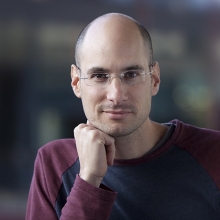Engines of progress
Research fellow chairs shine spotlight on key investigative role
People behind the science

Dr. Michael Tsoory advises faculty and students about how best to frame their research questions, assists in the design and implementation of experiments based on animal models, and helps analyze study results.
Behind every good principal investigator is a devoted team of scientists, postdoctoral fellows, and doctoral and masters students—a group that functions like a well-oiled machine to investigate some of the most pressing questions in science. At the Weizmann Institute, a key position in this team is that of a staff scientist: researchers with doctoral-level training and in many cases, prestigious postdoctoral fellowships under their belts. They are critical engines of success, providing much-needed expertise in a particular experimentation method or type of sophisticated equipment, and in many cases pursuing their own independent research. To date, 14 staff scientists hold Research Fellow Chairs (RFCs), and more than 100 staff scientists are eligible to become RFC incumbents.
Dr. Yael Shwartz and Dr. Michael Tsoory are examples of how this relatively small group of Weizmann personnel creates an outsized impact.
Dr. Shwartz, who holds the Maurice Lévy Research Fellow Chair, is an Institute-trained expert in science teaching. She worked as a high-school chemistry teacher while pursuing her PhD and—after doing postdoctoral research both at the Institute and the University of Michigan—joined the Weizmann staff in 2009. She is the Head of the National Teacher Center for Science and Technology in Junior High Schools, where she advances the professional development of 5,000 junior high-school science teachers through the Center’s workshops and conferences, its production of print and online resources, and its mentorship program.
Responding to the severe shortfall of trained chemistry teachers and facilities in Israeli schools, Dr. Shwartz and her colleagues developed “Chemistry Online”, a web-based curriculum that allows students to study chemistry via live, interactive sessions and home assignments. Now in its third year, the program’s inaugural cadre is now preparing to take the Ministry of Education’s matriculation exams at the highest level.
Staff scientist Dr. Michael Tsoory, an expert in psychology and neuroscience, is the Director of the Behavioral and Physiological Phenotyping Unit, a division within the Institute’s Department of Veterinary Resources. He advises faculty and students about how best to frame their research questions, assists in the design and implementation of experiments based on animal models, and helps analyze study results.
An expert in the use of mouse models to increase our understanding of human health and disease, Dr. Tsoory collaborates with approximately 100 scientists and students from 25 Institute labs. He has designed experiments revealing new insights about motor function, sensory perception, brain activity, and genetics. From assessments of learning and memory to anxiety and sociability, and from cardiac function to lung capacity, Dr. Tsoory’s work is central to the Weizmann Institute’s ongoing progress in biomedical research.
Like many outstanding staff scientists at the Weizmann Institute, Dr. Tsoory is a candidate for the establishment of a new Research Fellows Chair. Supported by generous donors around the world, Research Fellow Chairs cover the salary support of incumbent.
Dr. Yael Shwartz is supported by the Maurice Lévy Research Fellow Chair in Science Teaching.








